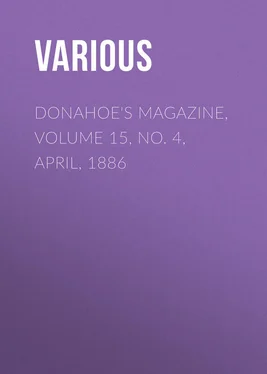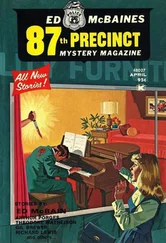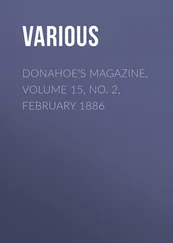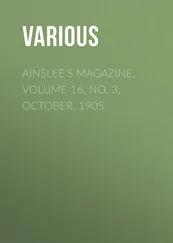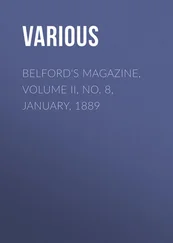Various - Donahoe's Magazine, Volume 15, No. 4, April, 1886
Здесь есть возможность читать онлайн «Various - Donahoe's Magazine, Volume 15, No. 4, April, 1886» — ознакомительный отрывок электронной книги совершенно бесплатно, а после прочтения отрывка купить полную версию. В некоторых случаях можно слушать аудио, скачать через торрент в формате fb2 и присутствует краткое содержание. Издательство: Иностранный паблик, Жанр: periodic, foreign_edu, на английском языке. Описание произведения, (предисловие) а так же отзывы посетителей доступны на портале библиотеки ЛибКат.
- Название:Donahoe's Magazine, Volume 15, No. 4, April, 1886
- Автор:
- Издательство:Иностранный паблик
- Жанр:
- Год:неизвестен
- ISBN:нет данных
- Рейтинг книги:5 / 5. Голосов: 1
-
Избранное:Добавить в избранное
- Отзывы:
-
Ваша оценка:
- 100
- 1
- 2
- 3
- 4
- 5
Donahoe's Magazine, Volume 15, No. 4, April, 1886: краткое содержание, описание и аннотация
Предлагаем к чтению аннотацию, описание, краткое содержание или предисловие (зависит от того, что написал сам автор книги «Donahoe's Magazine, Volume 15, No. 4, April, 1886»). Если вы не нашли необходимую информацию о книге — напишите в комментариях, мы постараемся отыскать её.
Donahoe's Magazine, Volume 15, No. 4, April, 1886 — читать онлайн ознакомительный отрывок
Ниже представлен текст книги, разбитый по страницам. Система сохранения места последней прочитанной страницы, позволяет с удобством читать онлайн бесплатно книгу «Donahoe's Magazine, Volume 15, No. 4, April, 1886», без необходимости каждый раз заново искать на чём Вы остановились. Поставьте закладку, и сможете в любой момент перейти на страницу, на которой закончили чтение.
Интервал:
Закладка:
Our course now led through winding walks under waving palms, by a house in the rocks, past doves, ducks, chickens, arches, arbors, flowering thickets, wild lime, sour orange and paw-paw trees. We inhaled the most delicious fragrance at every step. On emerging from the glades into an open field, we began to climb the hill to the church of Monserrat. As we ascended, the view of the valley grew wider. Scenes, unobserved from the level, now appeared enriching the picture. We crept rather than walked up the great hill, at one time gazing upon gullies and wells, at another, admiring big beautiful berries, but ever and anon pausing to take in the view of the vale. When the summit of the Cumbre was gained, I felt well rewarded for my toil, for never before did I see a landscape so brimful of poetry and repose. There it lay extending in every direction for miles, bounded on all sides by mountains with picturesque gaps, spurs, peaks and openings; it seemed to me more like a scene in a dream than a reality, – the character of the prospect was so ethereal, a fit retreat for celestials, – lovelier than the most delightful panorama. Still, it was a reality, and not a painting of indescribably happy combinations of contrasts in color, vegetation, lights, shadows, and forms, like the garden of Eden, and far fairer than the happy valley described in Rasselas. The Yumuri River flowed through it looking like a silver thread. Billowy fields of cane, rich pastures, clumps of feathery palms and shrubs with golden flowers adorned the vale. It is like a glimpse of Paradise to see it at sunset.
I turned with regret from this feast of nature, and walked with my companion along the extensive plateau on which the church and other buildings stood. A venerable, mild-looking old gentleman approached us. He was Migael Darna, the sexton and bell-ringer of Monserrat, living like a hermit on the top of the Cumbre. A handsome little boy with dark eyes and coal-black hair accompanied him. This was his son, of whom he seemed to be very fond. At a sign from Migael we entered the church. Its interior, like the outside, was very pretty. Behind the altar and around the side walls of the sanctuary stood a miniature mountain of cork, on the top of which rested a statue of the Blessed Virgin resembling the image supposed to be made by St. Luke, which graces the monastery of Monserrat in Spain. Flowers and gifts of various kinds were attached to the cork by faithful doners. On our way to the tower, I could see from the clever manner in which young Darna played the organ, that on the hills his father had not neglected his musical education.
After gaining the top we beheld a prospect, which, for grandeur and extent, could scarcely be surpassed. The valley to the left looked even more mysteriously enchanting than before, owing to its greater distance and depth. On the right the glorious ocean burst upon us, its blue and green waters in some places as smooth as glass, in others worked up into angry billows. We saw the ships in the bay, the coral reefs washed by the waves – the city with its sloping streets, quaint, gaudy buildings and villas resting below us like lords looking down on the scene. In front we observed brown, grassy, shrubby hills, cliffs, precipices and vast fastnesses. Behind us flowed the San Juan River by low, rich meadows, past numerous houses till it rested in the sea. Beyond appeared a chain of mountains, whose dark-blue peaks were almost lost in the clouds. The view of the country and city from the tower of this church is certainly the finest in all Cuba, and it was with the greatest reluctance that I turned from it to follow my companions down stairs. Bidding good-by to Migael, Signor Mariano and myself descended to the city over a grassy road, full of blue, white and yellow flowers. We noticed on one of the lowest slopes of the Cumbre one of the handsomest villas in Matanzas built in the midst of gardens, and surrounded by a pretty stone wall. Numerous statues and fountains adorned the grounds. Signor Mariano, being acquainted with the family, offered to introduce me. We were received at the door of this fine stone villa by Signora Torres who is regarded by the priests and people of Matanzas as the foremost Catholic lady in the city. The recent death of her husband and brother sorely afflicted her, but she endured this trial with Christian fortitude, and an ever-present desire to please and do good could readily be noticed even in the midst of her sorrow. As we moved through the house, I admired the lofty ceilings, handsome stained-glass windows, black and white marble floors, and splendid furniture that graced the several apartments. Coolness and shade, so desirable in the tropics, reigned here, and were rendered further agreeable by the sight of occasional rosy beams, the odor of flowers and songs of birds. The rich antique vases and fine old paintings on the the wall looked very beautiful. The most precious woods of the island were seen in the wainscoting and furniture. The chapel looked a rich and graceful little temple. All the rarest valuables seemed to be reserved for here. When the chaplain is home (as he generally is) Mass is celebrated in the villa every morning.
After saying a little prayer, we walked out on the front piazza. This had a fine tiled floor and several pretty iron seats and sofas. Its numerous vases were full of flowers. Its balustrades were of stone, with blue and gold, porcelain finish. Rustic baskets hung around it in appropriate numbers and graceful order. It faced the city and the bay. Down in the garden were all kinds of fruits and flowers. Oranges, bananas, pomegranates, caimetoes, pineapples, oleanders, cacti, allspice trees, enormous fuchsias, canicas, kaladiums, and numerous other varieties, bloomed in abundance, each and all emitting a fragrance quite irresistible. Prince Alexis of Russia, while on his visit to Matanzas, spent a few weeks in this villa and garden. He could not have selected a more charming spot in Cuba. As time was precious, we took our leave, thanking the good Senora for her kindness, and pursued our journey down the hill. On the right and left of us were high walls of calcareous rock, over the tops of which hung thousands of brilliant, sweet-scented flowers. The Casus de Benefecentia, a long, yellow stone building, with great pillars and piers, rested on a hill a short distance away, and on the edge of the street on which we walked, stood the handsome, sky-blue dwelling of a cure , who was attached to a charitable institution conducted by the sisters. I visited these buildings on an after occasion, accompanied by two priests, and was greatly edified and delighted with all I saw in them. Before we came to the Church of St. Carlos, we passed through the Plaza de Armas, the most beautiful square in Matanzas. A magnificent fountain ornamented the centre of a circular row of palms. Numerous fragrant shrubs and flowers flourished near at hand, and iron seats were provided for all who wished to rest. Beautiful stores and private dwellings line the enclosure, which is surrounded by gas lamps, sofas and wide-paved walks. The palace of the comandant , or governor, of the department, is situated on the east side. The Licco, or lyceum and club-house, stand on the north. The military band plays in the Plaza on Tuesday, Thursday and Sunday evenings. Thither all classes come then to hear the music, observe the fashions, form acquaintances, and chat with friends. On our arrival at the priest's house, Padre Barnada invited me to celebrate Mass, in the church, on the following morning (Ash Wednesday). I cheerfully consented, and then took my leave, intending to see more of the town. The attractions of Matanzas are greatly marred by the clouds of dust that are almost constantly drifting. As rain seldom falls the streets become very dry, and the steady passing and repassing of mules and heavy ox-carts, laden with sugar and molasses, cause the calcareous sand to rise and envelop everything. The Chinaman occupies a conspicuous place in the life scenes of Matanzas. He can be readily recognized whether attired in the long, loose, shabby shirt of the laborer, or the citizen's dress of the storekeeper. His peculiar gait, hair and countenance are very characteristic. He associates familiarly with the negro, is zealous, parsimonious, and so sensitive that he will even kill himself if he becomes incapable of revenging an insult. Most of these people in Cuba remain in a beastly state of degradation, while others of the race rise in the ranks, own elegant stores, and other establishments. A certain Chinaman in Havana owns the finest silk establishment in that city. Another keeps a hotel in Matanzas, styled the "Flower of America." Their diet chiefly consists of rice, fruit and vegetables. They are generally vaccinated on the tip of the nose. Chinese free railroad hands receive sixty dollars per month, in currency, and street laborers get twelve reals a day.
Читать дальшеИнтервал:
Закладка:
Похожие книги на «Donahoe's Magazine, Volume 15, No. 4, April, 1886»
Представляем Вашему вниманию похожие книги на «Donahoe's Magazine, Volume 15, No. 4, April, 1886» списком для выбора. Мы отобрали схожую по названию и смыслу литературу в надежде предоставить читателям больше вариантов отыскать новые, интересные, ещё непрочитанные произведения.
Обсуждение, отзывы о книге «Donahoe's Magazine, Volume 15, No. 4, April, 1886» и просто собственные мнения читателей. Оставьте ваши комментарии, напишите, что Вы думаете о произведении, его смысле или главных героях. Укажите что конкретно понравилось, а что нет, и почему Вы так считаете.
